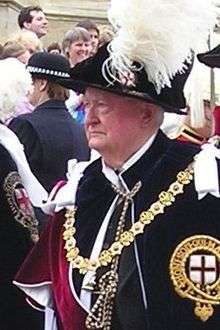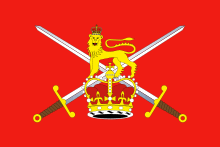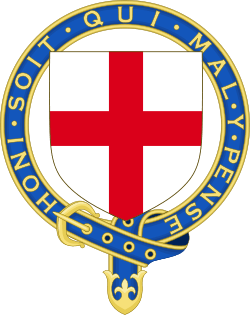Edwin Bramall
| The Lord Bramall | |
|---|---|
 Lord Bramall in the robes of a Knight Companion of the Order of the Garter, June 2006 | |
| Born |
18 December 1923 Tonbridge, Kent, England |
| Allegiance | United Kingdom |
| Service/branch | British Army |
| Years of service | 1942–85 |
| Rank | Field Marshal |
| Commands held |
Chief of the Defence Staff Chief of the General Staff Commander-in-Chief, Land Forces Commander British Forces in Hong Kong 1st Division 5th (Airportable) Infantry Brigade 2nd Battalion Royal Green Jackets |
| Battles/wars |
Second World War Indonesia–Malaysia confrontation Falklands War |
| Awards |
Knight of the Order of the Garter Knight Grand Cross of the Order of the Bath Officer of the Order of the British Empire Military Cross Mentioned in Despatches |
Field Marshal Edwin Noel Westby Bramall, Baron Bramall, KG, GCB, OBE, MC, JP, DL (born 18 December 1923) is a retired senior British Army officer. He served as Chief of the General Staff, the professional head of the British Army, between 1979 and 1982, and as Chief of the Defence Staff, professional head of the British Armed Forces, from 1982 to 1985. He developed the concept of the "Fifth Pillar" pulling together the activities of defence attachés to form a structure for intervention in smaller countries.
Early life and family
Bramall was born on 18 December 1923 in Tonbridge, Kent, England. He was born the son of Edmund Haselden Bramall and Katherine Bridget Bramall (née Westby)[1] and was educated at Eton College.[2] In 1949 he married Dorothy Avril Wentworth Vernon; they had one son and one daughter.[1] His older brother Ashley Bramall was a barrister, Labour politician and Leader of the Inner London Education Authority.[3]
Military career
Bramall was commissioned as a second lieutenant in the King's Royal Rifle Corps on 22 May 1943 during the Second World War.[4] He took part in the Normandy landings in June 1944[2] and served with the 2nd Battalion of his regiment in Northwest Europe during the later stages of the war, receiving the Military Cross on 1 March 1945.[5]
Bramall was promoted to lieutenant on 18 June 1946[6] and served in the occupation of Japan from 1946, before becoming an instructor at the School of Infantry in 1949.[1] Promoted to captain on 18 December 1950,[7] he was stationed in the Middle East from 1953[8] and was then promoted to major on 18 December 1957.[9] Continuing his military career, he served two years as an instructor at the Staff College, Camberley from 1958, and then was appointed to serve on Lord Mountbatten's staff in 1963.[8]
-_D-day_6_June_1944_B5245.jpg)
Appointed an Officer of the Order of the British Empire in the New Year Honours 1965,[10] and promoted to lieutenant colonel on 25 January 1965,[11] he was appointed Commanding Officer of the 2nd Battalion, King's Royal Rifle Corps: the Battalion was deployed to Borneo during the Indonesia–Malaysia confrontation in the first half of 1966 where his actions earned him a mention in despatches.[12] He was given command of the 5th (Airportable) Infantry Brigade in November 1967[8] with promotion to brigadier on 31 December 1967.[13]
He was made General Officer Commanding the 1st Division on 6 January 1972,[14] with the substantive rank of major general from 6 April 1972,[15] Commander of British Forces in Hong Kong with the rank of lieutenant general on 1 December 1973[16] and appointed a Knight Commander of the Order of the Bath in the New Year Honours 1974.[17] He went on to be Commander-in-Chief, UK Land Forces on 15 May 1976[18] and was promoted to full general on 25 June 1976.[19] He was appointed Vice-Chief of the Defence Staff (Personnel and Logistics) on 20 March 1978,[20] advanced to Knight Grand Cross of the Order of the Bath in the New Year Honours 1979,[21] before being made ADC General to the Queen on 26 June 1979[22] and appointed Chief of the General Staff on 14 July 1979.[23] In this role he strongly supported the plan in May 1982 to land troops at San Carlos Water and then advance rapidly from those positions at the early stages of the Falklands War.[24]
He was promoted to field marshal on 1 August 1982,[25] and appointed Chief of the Defence Staff on 1 October that year.[26] In this capacity he developed the concept of the "Fifth Pillar" pulling together the activities of defence attachés to form a structure for intervention in smaller countries.[24] He retired in November 1985.[24] He was also Colonel of the 3rd Battalion the Royal Green Jackets from December 1973, Colonel of the 2nd King Edward VII's Own Gurkha Rifles (The Sirmoor Rifles) from 14 September 1976[27] and Colonel Commandant of the Special Air Service Regiment from 19 May 1985.[28]
Later career
After his retirement Bramall served as Lord-Lieutenant of Greater London from 1986[29] to 1998.[1] He was invested as a Knight of the Garter in 1990.[30] He was a former President of the Marylebone Cricket Club (MCC)[31] and is now an Honorary Life Vice President of the MCC.[32] His other interests include painting and travel and he is a Vice-President of the welfare organisation SSAFA Forces Help.[1]
Bramall was created a life peer as Baron Bramall of Bushfield in the County of Hampshire in 1987.[33][34] Bramall spoke out in the House of Lords against the involvement of the United Kingdom in the Second Iraq War warning that "unlike naked aggression, terrorism cannot be defeated by massive military means" but by "competent protection and positive diplomacy".[35]
On 25 April 2013 Bramall retired from service in the House of Lords. He retains his title.[36]
Honours, styles, and arms
Awards and decorations
- Military Cross (1945)[5]
- Officer of the Order of the British Empire (1965)[10]
- Knight Commander of the Order of the Bath (1974)[17]
- Knight Grand Cross of the Order of the Bath (1979)[21]
- Knight of the Most Venerable Order of the Hospital of St. John of Jerusalem (1986)[37]
- Life peer - as Baron Bramall, of Bushfield in the County of Hampshire (1987)[33][34]
- Knight of the Order of the Garter (1990)[30]
- Pingat Jasa Malaysia[38]
Styles of address
- 1923–1945: Mr Edwin Bramall
- 1945–1965: Mr Edwin Bramall MC
- 1965–1974: Mr Edwin Bramall OBE MC
- 1974–1979: Sir Edwin Bramall KCB OBE MC
- 1979–1987: Sir Edwin Bramall GCB OBE MC
- 1987–1990: The Right Honourable The Lord Bramall GCB OBE MC
- 1990–: The Right Honourable The Lord Bramall KG GCB OBE MC
Coat of arms
 |
Sinister: a Chinese Dragon proper, holding in the sinister claw a Maltese Cross Sable.
|
References
- 1 2 3 4 5 Who's Who 2010, A & C Black, 2010, ISBN 978-1-4081-1414-8
- 1 2 Heathcote, Anthony pg 53
- ↑ "Field Marshal The Lord Bramall of Bushfield". Royal Green Jackets Association. Retrieved 24 December 2011.
- ↑ The London Gazette: (Supplement) no. 36074. p. 2980. 29 June 1943. Retrieved 24 December 2011.
- 1 2 The London Gazette: (Supplement) no. 36961. p. 1176. 27 February 1945. Retrieved 24 December 2011.
- ↑ The London Gazette: (Supplement) no. 37698. p. 4238. 20 August 1946. Retrieved 24 December 2011.
- ↑ The London Gazette: (Supplement) no. 39093. p. 6320. 19 December 1950. Retrieved 24 December 2011.
- 1 2 3 Heathcote, Anthony pg 54
- ↑ The London Gazette: (Supplement) no. 41254. p. 7346. 13 December 1957. Retrieved 24 December 2011.
- 1 2 The London Gazette: (Supplement) no. 43529. p. 6. 29 December 1964. Retrieved 24 December 2011.
- ↑ The London Gazette: (Supplement) no. 43682. p. 5687. 11 June 1965. Retrieved 24 December 2011.
- ↑ The London Gazette: (Supplement) no. 44196. p. 13461. 9 December 1966. Retrieved 24 December 2011.
- ↑ The London Gazette: (Supplement) no. 44493. p. 74. 29 December 1967. Retrieved 24 December 2011.
- ↑ The London Gazette: (Supplement) no. 45569. p. 347. 10 January 1972. Retrieved 24 December 2011.
- ↑ The London Gazette: (Supplement) no. 45641. p. 4283. 10 April 1972. Retrieved 24 December 2011.
- ↑ The London Gazette: (Supplement) no. 46143. p. 14387. 3 December 1973. Retrieved 24 December 2011.
- 1 2 The London Gazette: (Supplement) no. 46162. p. 2. 28 December 1973. Retrieved 24 December 2011.
- ↑ The London Gazette: (Supplement) no. 46901. p. 7063. 17 May 1976. Retrieved 24 December 2011.
- ↑ The London Gazette: (Supplement) no. 46947. p. 8989. 28 June 1976. Retrieved 24 December 2011.
- ↑ The London Gazette: (Supplement) no. 47493. p. 3563. 20 March 1978. Retrieved 24 December 2011.
- 1 2 The London Gazette: (Supplement) no. 47723. p. 2. 29 December 1978. Retrieved 24 December 2011.
- ↑ The London Gazette: (Supplement) no. 47911. p. 9345. 23 July 1979. Retrieved 24 December 2011.
- ↑ The London Gazette: (Supplement) no. 47916. p. 9695. 30 July 1979. Retrieved 24 December 2011.
- 1 2 3 Heathcote, Anthony pg 55
- ↑ The London Gazette: (Supplement) no. 49069. p. 10134. 2 August 1982. Retrieved 24 December 2011.
- ↑ The London Gazette: (Supplement) no. 49142. p. 13571. 18 October 1982. Retrieved 24 December 2011.
- ↑ The London Gazette: (Supplement) no. 47012. p. 12491. 13 September 1976. Retrieved 24 December 2011.
- ↑ The London Gazette: (Supplement) no. 50128. p. 7058. 20 May 1985. Retrieved 24 December 2011.
- ↑ The London Gazette: no. 50422. p. 1671. 5 February 1986.
- 1 2 The London Gazette: no. 52120. p. 8251. 24 April 1990. Retrieved 22 May 2012.
- ↑ "British media wants Pak team to be sent home". cricketnext. 31 August 2010. Retrieved 24 December 2011.
- ↑ "Official House of Lords Biography". House of Lords. Retrieved 24 December 2011.
- 1 2 The London Gazette: no. 50834. p. 2023. 16 February 1987.
- 1 2 The Edinburgh Gazette: no. 22092. p. 195. 13 February 1987.
- ↑ "House of Lords Debates". 26 May 2004. Retrieved 26 May 2007.
- ↑ "Retirement of a Member: Lord Bramall". Parliamentary Debates (Hansard). United Kingdom: House of Lords. 25 April 2013. col. 1519.
- ↑ The London Gazette: no. 50716. p. 14693. 14 November 1986.
- ↑ Raji, Mohd Arshad (18 April 2010). "Pingat Jasa Malaysia medal presentation". Retrieved 5 March 2014.
- ↑ The Companion Magazine. College of St George. No. 15 (Summer-Autumn 2012), p. 5.
- ↑ Chesshyre, Hubert (1996), The Friends of St. George's & Descendants of the Knights of the Garter Annual Review 1995/96, VII, p. 289
Further reading
- Heathcote, Tony (1999). The British Field Marshals 1736–1997. Barnsley: Pen & Sword. ISBN 0-85052-696-5.
- Tillotson, Michael (2006). The Fifth Pillar: the life and philosophy of the Lord Bramall K.G. Stroud: Sutton Publishing. ISBN 0-7509-4239-8.
External links
| Wikimedia Commons has media related to Edwin Bramall, Baron Bramall. |
| Military offices | ||
|---|---|---|
| Preceded by Jack Harman |
General Officer Commanding the 1st Division 1972–73 |
Succeeded by David Alexander-Sinclair |
| Preceded by Sir Richard Ward |
Commander of British Forces in Hong Kong 1973–76 |
Succeeded by Sir John Archer |
| Preceded by Sir Roland Gibbs |
Commander-in-Chief, UK Land Forces 1976–1978 |
Succeeded by Sir John Archer |
| Preceded by Sir Anthony Morton |
Vice-Chief of the Defence Staff 1978–79 |
Succeeded by Sir Patrick Howard-Dobson |
| Preceded by Sir Roland Gibbs |
Chief of the General Staff 1979–82 |
Succeeded by Sir John Stanier |
| Preceded by Sir Terence Lewin |
Chief of the Defence Staff 1982–85 |
Succeeded by Sir John Fieldhouse |
| Honorary titles | ||
| Preceded by The Baroness Phillips |
Lord Lieutenant of Greater London 1986–98 |
Succeeded by Peter Imbert |

